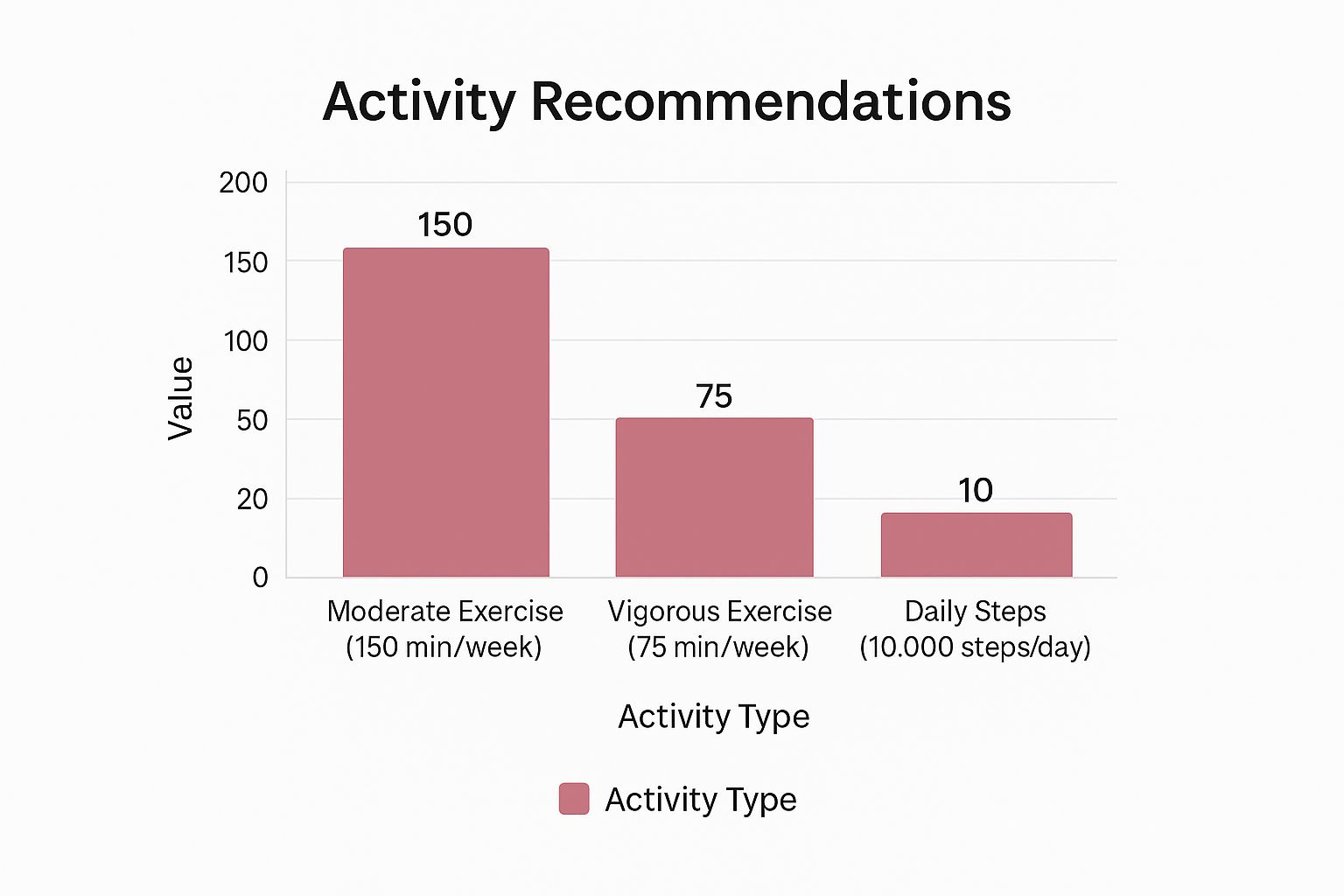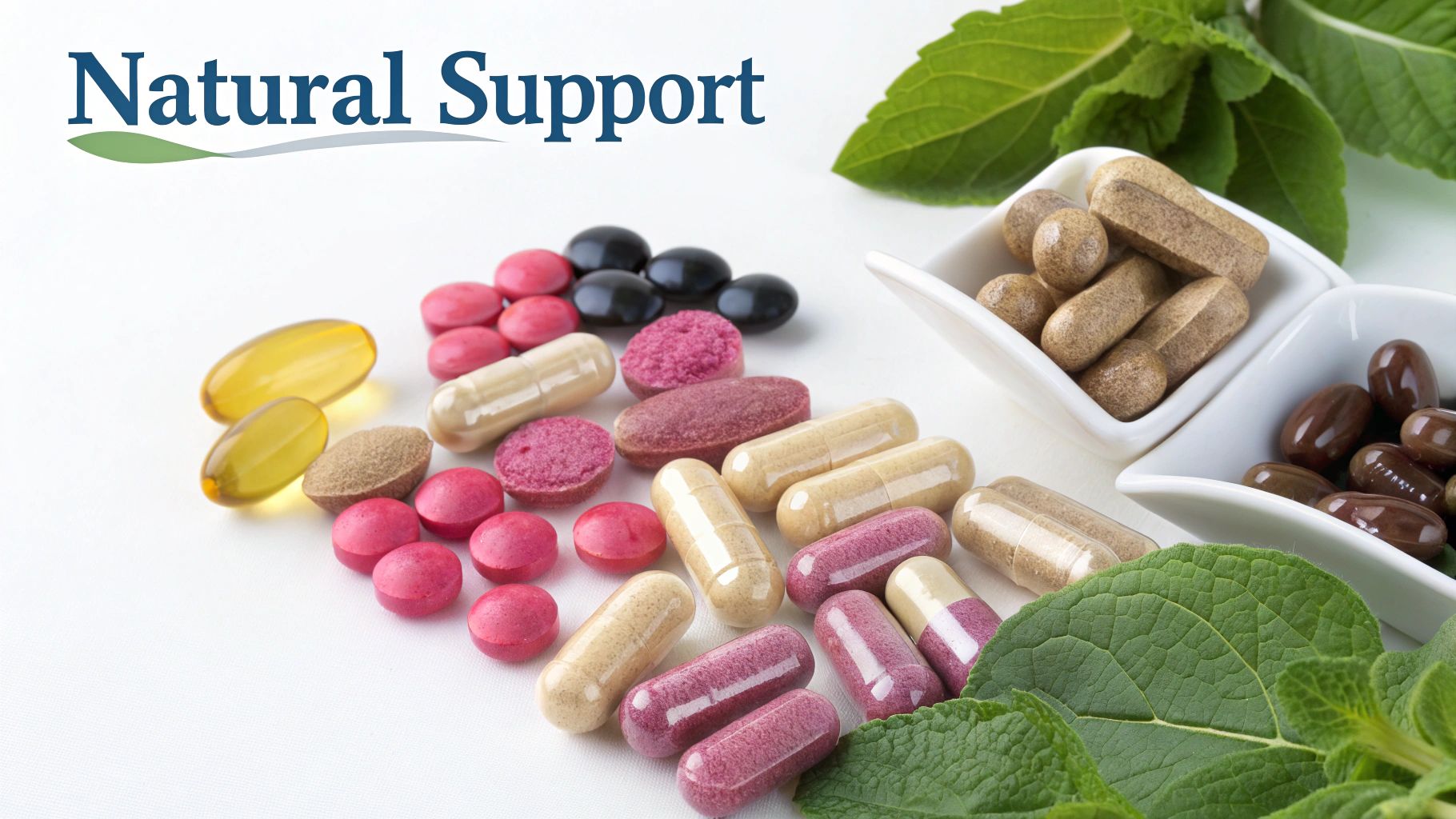Why Your Hormones Feel Like They're Sabotaging You
Let's be honest, hormonal imbalance isn't just in your head. We've all been there, brushed off with a "it's just stress" diagnosis. I remember feeling constantly exhausted, and that's exactly what my doctor told me. As if simply willing myself to feel better would magically solve the problem. But modern life is tough on our hormones in ways that past generations never experienced.
Think about it: the pressure to juggle work and family, environmental toxins, and the constant "go-go-go" mentality. It's a recipe for hormonal havoc. Even things we think are healthy can sometimes throw things off balance. I was dedicated to a low-fat diet for years, convinced it was the healthiest way to eat. Turns out, healthy fats are essential for hormone production! Live and learn, right?
This is where traditional medicine often lets women down. We're left to suffer, often told to just wait and see, while dismissing our own experiences. Our bodies are constantly trying to communicate with us, sending signals that something’s not quite right. That afternoon slump? Sudden breakouts? Mood swings that leave you feeling unrecognizable? These aren't personal failings; they're messages from your body. Ignoring them only lets the imbalances get worse. And let's face it, women's health historically hasn't received the attention it deserves. In the UK, for example, there's a significant gap in addressing women’s health issues, particularly hormone balance. A 2021 study showed the UK has the largest female health gap in the G20 and the 12th largest globally. This means women's concerns are often misdiagnosed or downplayed. Read more about this research.
Understanding Your Hormonal Fingerprint
Hormonal chaos isn’t just "part of being a woman." It’s a sign that something needs adjusting. Figuring out your individual hormonal profile is the key to real, lasting change. What works for one person might not work for another. Personally, after a lot of testing, I found out I have a genetic tendency towards low progesterone. This explained my lifelong struggles with sleep and anxiety, especially during the latter half of my cycle.
Knowing this finally gave me a direction. Instead of following generic advice, I could focus on things that specifically support progesterone. I prioritized sleep, managed stress with gentle yoga (intense workouts were a no-go!), and started taking targeted supplements like Oji Shilajit gummies. This personalized approach was game-changing.
You are your own best health advocate. Don’t let anyone dismiss your symptoms. Your hormones are communicating with you. Listen to them, learn from them, and take action. Your body will thank you.
Reading Your Body's SOS Signals Before It's Too Late
Your body's always talking to you, giving you little clues about what's going on inside. But we're all so busy these days that it's easy to brush these off as just being tired or "that time of the month." What if those whispers are actually shouts? What if they're urgent messages from your hormones trying to get your attention? That afternoon slump that has you craving coffee? The sudden breakout seemingly overnight? Those mood swings that make you feel like a different person? These aren't just random things; they're information. They're your body saying, "Hey, something's not right!"
Decoding the Whispers: What Your Symptoms Mean
Hormonal imbalances show up differently in everyone. Weight gain for one person might be insomnia for another. Understanding how these imbalances appear is crucial for getting help early. I had a friend who struggled with digestive issues for years. Doctor after doctor, test after test, and no one could figure it out. Finally, a specialist discovered a thyroid issue. Once her thyroid hormones were balanced, her gut problems vanished.
This really shows how important it is to look at the whole picture. Are you constantly tired, even after a full night's sleep? Is your period all over the place? Have you noticed changes in your sex drive or vaginal dryness? These could all be signs of a hormonal imbalance. Also, pay attention to your mood. Increased anxiety, irritability, or feeling down can also be tied to fluctuating hormones. It's like solving a puzzle; each symptom is a clue.
Why Early Intervention Matters
Sadly, getting a quick diagnosis for hormonal problems can be tough. Even with all the advances in healthcare, over half of women in the UK wait six months or more for a diagnosis for conditions like PCOS or endometriosis, with nearly a third waiting over a year. This wait seriously impacts their quality of life. Find out more about these diagnostic delays. Early intervention is key because it lets you tackle the root of the problem before it gets worse. Think of it like a small crack in a dam. Fix it early, and it's an easy repair. Ignore it, and that small crack can cause a disaster.

Listening to Your Body: You Are Your Own Best Advocate
Learning to recognize your body's unique SOS signals is a huge step towards taking back control of your hormonal health. It's about tuning in, paying attention, and trusting your gut. You know your body better than anyone. Don’t ignore your symptoms or let anyone tell you it's "all in your head." By understanding how to balance hormones and spotting the early warning signs, you can take steps to support your body’s natural healing and build lasting well-being.
The Foods That Love Your Hormones Back
Forget restrictive diets and picture-perfect Instagram meals. Let's talk about real food that supports your hormones without needing a chef's certification. I've talked with so many women who've found food freedom while healing their hormones, and a common thread is understanding which nutrients truly fuel hormone production. We’ll also delve into why when you eat might be just as crucial as what you eat.
We'll explore how some supposedly "healthy" foods might actually be working against your hormonal goals, and discover some surprising additions to your Tesco basket that can be real game-changers. Whether you're meal prepping for the family or grabbing lunch on the go in London, we'll cover practical ways to incorporate hormone-supporting foods into your everyday life. This isn't about being perfect; it’s about making informed choices that help your body find its natural balance.
Nourishing Your Hormones: The Building Blocks of Balance
Just like a car needs the right petrol, your hormones need specific nutrients to function at their best. Protein is the foundation, providing the amino acids necessary for building hormones. Getting enough protein at every meal, especially breakfast, helps stabilize blood sugar and prevents those energy dips that have you reaching for the biscuit tin.
Healthy fats are also key players. They're vital for hormone production, cell communication, and absorbing those important fat-soluble vitamins. Avocados, nuts, seeds, and oily fish? They're not the enemy! I used to be terrified of fat, opting for low-fat everything. Once I added healthy fats back in, my energy levels shot up, and my periods became so much more regular.
And don't forget fibre. This unsung hero helps regulate blood sugar and eliminate excess hormones, preventing them from recirculating and causing issues. Think whole grains, fruits, and vegetables – all easy to find at your local Sainsbury's.
Timing is Everything: Why When You Eat Matters
What you eat is crucial, but when you eat also significantly impacts your hormone balance. Consistent meal times can regulate your circadian rhythm, which influences hormone production. Try to eat your meals at roughly the same time each day, even on weekends. This doesn't have to be rigid! Even a general schedule can make a difference.
For some women, front-loading calories earlier in the day can be really helpful. A larger breakfast and lunch, followed by a lighter dinner, can support better sleep and improve insulin sensitivity, which is essential for managing weight and balancing blood sugar. Personally, I’ve found that a good breakfast with protein and healthy fats keeps me going strong all morning, avoiding that mid-morning slump.

The infographic above shows the recommended amounts of moderate exercise (150 minutes per week), vigorous exercise (75 minutes per week), and daily steps (10,000) for optimal health. This illustrates how different types and durations of physical activity contribute to overall well-being, including hormonal balance. Finding an activity combination you enjoy and can stick with is key.
From Foe to Friend: Rethinking "Healthy" Foods
Sometimes, foods we think of as healthy can actually throw our hormones out of whack. Processed foods, even those labelled "low-fat" or "diet," are often packed with sugar, artificial ingredients, and inflammatory oils that can disrupt your hormonal balance. Even those seemingly harmless “diet” fizzy drinks can negatively impact your gut microbiome, which plays a huge role in hormone regulation.
Too much caffeine and alcohol can also interfere with hormone production and sleep. While a morning coffee is probably fine, several cups throughout the day can contribute to anxiety and adrenal fatigue. Alcohol, even in moderation, can disrupt sleep and affect liver function, which hinders your body's ability to process and eliminate excess hormones.
To help illustrate this further, let's look at a practical comparison of foods that support hormonal balance versus those that can disrupt it.
| Food Category | Hormone-Supporting Options | Foods to Limit | Why It Matters |
|---|---|---|---|
| Protein | Lean meats, poultry, fish, beans, lentils, tofu, eggs | Processed meats, excessive protein shakes | Provides building blocks for hormones, stabilizes blood sugar |
| Fats | Avocados, nuts, seeds, olive oil, fatty fish | Trans fats, hydrogenated oils, processed snacks | Essential for hormone production and cell function |
| Carbohydrates | Whole grains, fruits, vegetables | Refined grains, sugary drinks, processed foods | Provides sustained energy, regulates blood sugar |
| Dairy | Full-fat Greek yogurt, kefir (in moderation) | Low-fat or sweetened dairy products | Can impact insulin levels and hormone production |
| Beverages | Water, herbal tea | Sugary drinks, excessive caffeine, alcohol | Hydration is key for overall health, other beverages can disrupt hormones and sleep |
This table highlights the importance of choosing whole, unprocessed foods to support your hormonal health. By focusing on nutrient-rich options and limiting processed foods, sugary drinks, and excessive caffeine and alcohol, you can create a dietary foundation for hormonal balance.
You might also want to explore supplements that can further support hormone balance: Check out our guide on supplements for hormone balance. Finding what works best for you is a personal journey, but understanding the role of nutrition is a powerful first step. By making informed choices and nourishing your body with whole, real foods, you can create a foundation for lasting hormonal harmony.
Exercise That Heals Instead of Harming Your Hormones
Here's the honest truth: that killer workout that felt amazing in your twenties might not be doing your hormones any favors now. I remember those intense boot camps, feeling like I could conquer the world. But as I got older, I noticed they left me wired but tired, not energized and strong. Let's talk about how different types of exercise can impact your hormones at different life stages, drawing on insights from women who have found what works best for them.
Matching Your Movement to Your Body's Needs
Our bodies change, so our workouts should too. A cortisol-soaked system probably needs gentle yoga more than another HIIT session. I learned this the hard way. My anxiety was sky-high, and I kept hitting the gym, thinking I was helping. It actually made it worse! Switching to restorative yoga and nature walks was a game-changer. I wasn't constantly exhausted and on edge anymore.

Tuning into where your body is today – not where you think it should be – is key. This means listening to your body's signals. Are you genuinely energized by that spin class, or are you just pushing through on willpower? Sometimes, a gentle walk in the park or a relaxing swim is all your hormones need.
Cycle Syncing: Working With Your Natural Rhythms
Think about syncing your workouts with your cycle. Hormone levels fluctuate throughout your menstrual cycle. High-impact exercise during your luteal phase (the week before your period) might worsen PMS symptoms for some women, while gentle movement can be really helpful.
Personally, during my luteal phase, I focus on restorative yoga and Pilates. These gentler forms of exercise help ease my PMS symptoms and actually give me more energy. Then, during my follicular phase (the week after my period), I feel more energized and can handle more intense workouts like cycling or strength training.
Understanding how stress hormones react to different exercise intensities is important. Intense exercise can be great, but too much can elevate cortisol, especially if you're already stressed. Chronically high cortisol can disrupt your hormones, impacting everything from sleep to your menstrual cycle. Balance is key for both physical and hormonal health.
Staying Active Even When Your Energy is Low
Let's be real: when your energy is unpredictable, formal workouts can feel overwhelming. And that's okay! Finding little ways to move throughout the day can be surprisingly beneficial. Take the stairs instead of the elevator, walk or bike to the store, or even just do some stretches at your desk. Even on days when I feel completely drained, I try to get outside for a short walk. The fresh air and movement always helps.
Think of movement as nourishment, not punishment. It’s about finding what feels good, what supports your body, and what you can realistically do. You don’t have to be a gym fanatic to benefit from exercise. It's about nourishing your body with movement that makes you thrive. This shift in perspective can be incredibly positive for both your physical and mental well-being. It’s about honoring your body and working with it, not against it. This approach is a powerful way to support your hormonal health and rediscover the joy of movement.
Stress Management That Fits Your Real Life
Let's be real, telling someone with hormonal issues to "just relax" is useless. It's like telling them to sprout wings and fly. Especially when hormones are going haywire, the idea of an hour of daily meditation feels laughable. Trust me, I've been there, juggling work, family, and life in general. Five minutes to myself felt like winning the lottery.
So, ditch the monk-like serenity fantasy. Let's talk real-life stress management – micro-strategies that fit into a packed schedule and actually deliver. By talking to other women who've successfully navigated this, I've picked up some seriously effective tricks you can use even when time is super tight.
Why Stress Is So Brutal for Your Hormones
Chronic stress throws a major wrench into your hormonal balance. Constant stress means your body is pumping out cortisol, that "fight-or-flight" hormone. Short bursts? No problem, even helpful. But high cortisol levels all the time? That's a recipe for disaster. It messes with sleep, your menstrual cycle, and even your metabolism. I remember one super stressful time when my periods were all over the place. Looking back, it's clear the constant stress was a huge factor.
Tiny Tweaks, Big Impact: Stress Management Strategies
The good news? Small daily changes can make a world of difference over time. It's like saving loose change. Each penny seems insignificant, but eventually, it adds up to real money. Stress management works the same way. Small, consistent efforts build up to significant improvements.
-
Breathing Exercises: Forget the yoga mat and quiet room. Deep breathing is doable anywhere, anytime. Stuck in traffic? Deep breaths. Overwhelmed at work? Step away for a quick breathing break. Even a few conscious breaths calm your nervous system and lower cortisol.
-
Mini-Mindfulness Breaks: Close your eyes for just a minute and tune in to your senses. What do you hear, smell, and feel? This simple act brings you back to the present and interrupts that stressful thought loop. I often do this at lunch, even just for a couple of minutes. It helps me clear my head and feel more centered.
-
Boundary Setting: This one's crucial. Learning to say "no" guilt-free protects your energy and prevents burnout. It's not selfish; it's about prioritizing your well-being. I used to be a "yes" person, always overloaded. Learning to set boundaries changed everything, both my stress and my hormones.
-
Nature Time: A short walk in the park can work wonders. Being in nature lowers cortisol and boosts mood. I try to get outside every day, even if it's just a quick walk around the block. It’s a simple way to connect with nature and de-stress.
-
Connect With Others: Talking to a friend, family member, or therapist helps process stress and makes you feel supported. Shared burdens are lighter burdens. Connecting with friends who "get it" has been a lifeline for me.
You can also explore other natural remedies for stress: Check out our guide on top natural remedies for stress relief.
Stress management isn’t a one-size-fits-all thing. It's about finding what works for you and weaving it into your everyday life. Small, consistent efforts can lead to big changes in your hormonal health and how you feel overall. It’s not about perfect zen; it’s about finding what you can stick with, in the real world.
Sleep Secrets for Hormonal Healing
Sleep. It’s not just about catching some Zs; it’s a crucial time for your body to recharge and balance your hormones. But here's the catch-22: when your hormones are out of whack, getting good sleep can feel impossible. It's a frustrating cycle. Let's break down the connection between sleep and hormones, and I’ll share some tips that have genuinely helped me – even during those times when my mind is racing or I’m dealing with hot flashes.
The Sleep-Hormone Connection: Why It Matters
Sleep and hormones are deeply connected. While you sleep, your body works to regulate essential hormones like cortisol (your stress hormone), melatonin (your sleep hormone), and growth hormone. These hormones affect everything from how you manage stress to your metabolism and even cell repair. When your sleep is disrupted, these hormones can get thrown off balance, leading to a cascade of issues. I remember a time when I was chronically sleep-deprived; my anxiety was sky-high, my skin looked terrible, and I was constantly on edge. Getting my sleep back on track was a game-changer for my hormone health.
Timing is Key: More Than Just Hours
It’s not only about how much sleep you get, but also when you sleep. Your body operates on a natural sleep-wake cycle called your circadian rhythm, which influences hormone production. Going to bed and waking up around the same time every day, even on weekends, helps regulate this rhythm, leading to more balanced hormone levels. I've noticed that even when I can't maintain a perfect sleep schedule, aiming for consistency makes a difference in how I feel.
Creating a Sleep Sanctuary: Simple Changes, Big Results
Transforming your bedroom into a sleep sanctuary can have a surprisingly big impact. Think dark, cool, and quiet. Invest in blackout curtains, earplugs, or a white noise machine if needed. For me, small changes like using an eye mask and keeping my room cooler have significantly improved my sleep quality. It's all about creating that perfect, restful cave.

Beyond the Bedroom: Lifestyle Strategies for Better Sleep
Sometimes, improving sleep requires looking beyond the bedroom. Regular exercise, a balanced diet, and stress management techniques all play a role. A relaxing bedtime routine can also work wonders. This could be a warm bath, reading a book, or listening to calming music. Cutting out caffeine and alcohol before bed can also make a huge difference. I have a friend who used to struggle with insomnia. She started doing yoga before bed and stopped drinking wine in the evenings, and it dramatically improved her sleep.
It’s not about achieving perfect sleep, but rather about finding what works for you. Experiment with these tips, and remember that prioritizing sleep is a key part of achieving hormonal balance.
Natural Support That Actually Makes a Difference
Sometimes, even with the best diet and lifestyle, our bodies need a little extra nudge to bring hormones back into balance. It happens! Let's talk about some natural supplements and herbs that can genuinely help, and cut through the marketing hype to figure out what really works. We'll also cover key nutrients that are often low in women experiencing hormonal imbalances, and how to safely address those deficiencies.
Bridging the Gap: Targeted Supplements for Hormonal Health
I've found that certain supplements can be game-changers when it comes to supporting natural hormone production. For example, Oji Shilajit gummies offer a convenient and tasty way to get a powerful blend of over 85 trace minerals, fulvic acid, and natural antioxidants – all in a plant-based, zero-sugar gummy. They can be that extra boost you need on your journey to hormonal harmony. Shilajit's mineral richness and adaptogenic qualities work to support your body’s inherent hormone production. As a quick reminder, adaptogens are natural substances that help your body manage stress, which as we know, plays a huge role in hormonal balance.
Want to learn more? Check out this helpful resource: Exploring supplements for hormone balance
Addressing Nutrient Deficiencies: Filling the Gaps
Nutrient deficiencies can seriously throw off your hormone production. Take magnesium, for example. It’s a workhorse involved in over 300 biochemical reactions in the body, including – you guessed it – hormone regulation. Many women are magnesium deficient, and this can worsen hormonal symptoms like anxiety, fatigue, and poor sleep. Zinc is another important one, crucial for thyroid hormone production and reproductive health. Making sure you're getting enough of these essential nutrients can make a world of difference.
Access and Equity: An Important Note on HRT
It's important to acknowledge that access to hormonal support, like hormone replacement therapy (HRT), isn't the same for everyone in the UK. In 2024, data showed that Black women were about five times less likely to be on HRT than the general population (around 5.2% receiving treatment), while Asian women were about four times less likely (around 6.2%). This disparity is concerning, and it's vital to advocate for equitable access to healthcare for all. Learn more about these HRT access disparities.
To help you navigate the world of natural hormone support, I’ve put together this table:
Natural Hormone Support Options by Concern: A comprehensive guide to natural supplements and herbs that target specific hormonal concerns, with key benefits and important considerations.
| Hormonal Concern | Natural Support Options | Key Benefits | Considerations |
|---|---|---|---|
| Low Energy & Fatigue | Shilajit, Magnesium, Adaptogens | Increased energy levels, improved stress response, better sleep | Consult with your doctor before combining with other medications |
| Stress & Anxiety | Ashwagandha, L-Theanine, Magnesium | Reduced stress hormones, improved mood, better sleep quality | Dosage may vary depending on individual needs |
| Menstrual Irregularities | Vitex, Chasteberry, Evening Primrose Oil | Regulates menstrual cycle, reduces PMS symptoms | Not recommended for pregnant or breastfeeding women |
| Low Libido | Maca Root, Tribulus Terrestris | Increased libido, improved sexual function | May interact with certain medications |
This table gives you a starting point for exploring natural options. Remember, it’s always best to talk to a healthcare professional to determine what’s right for you.
Choosing Wisely: Supplement Quality and Safety
Not all supplements are made the same. Choosing high-quality products from reputable brands is key. Look for third-party testing – this verifies that you’re getting what the label says and that the product is free of contaminants. It’s also crucial to be aware of potential interactions between supplements and any medications you’re currently taking. A chat with your doctor or a registered dietitian before starting any new supplement is always a good idea. They can help you select the right supplements for your individual needs and make sure there are no conflicts with other medications or health conditions.
Ready to explore how Shilajit can support your hormonal health? Head over to Oji Shilajit and discover their premium gummies.








